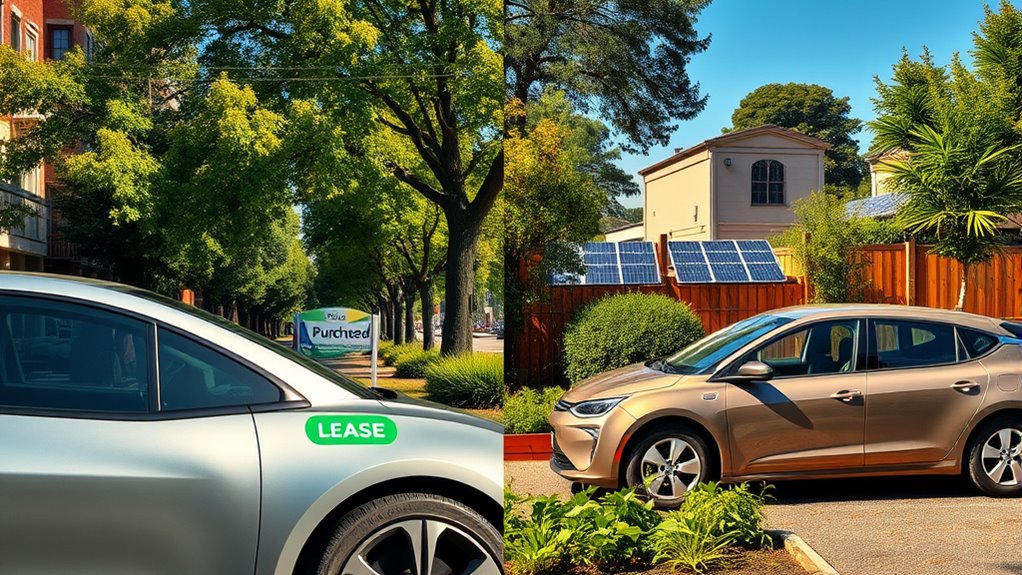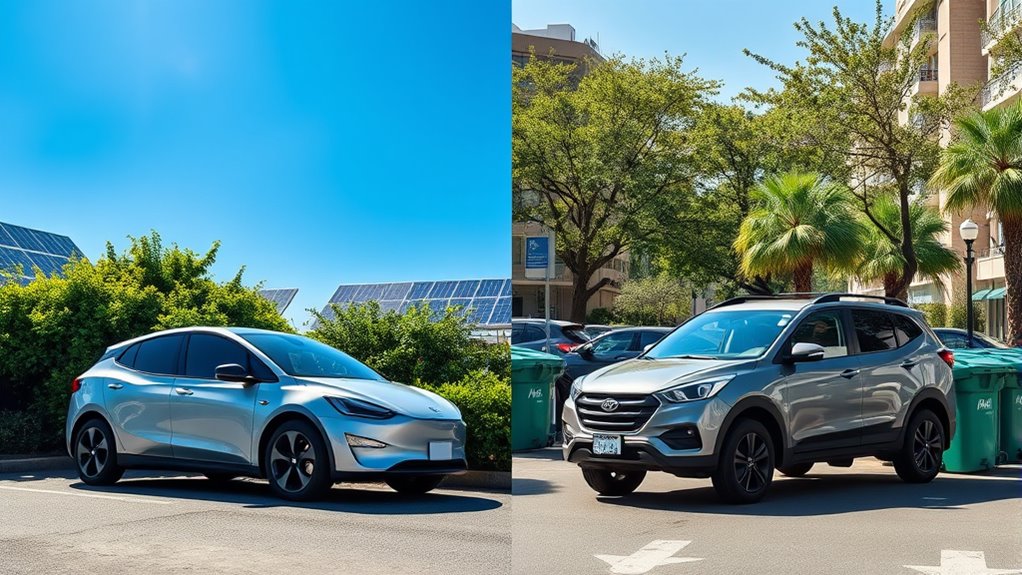Choosing to lease an electric vehicle can be better for the environment if you prefer switching to newer, more efficient models frequently. Leasing encourages upgrades with longer-range, eco-friendly features, and supports cleaner tech. Buying used EVs extends their lifespan, reducing waste and resource use. Pairing your vehicle with renewable energy sources like solar power further amplifies your eco-impact. Keep exploring to discover how your choices can make a meaningful difference for our planet.
Key Takeaways
- Leasing promotes frequent upgrades to newer, more efficient EV models with better batteries and lower emissions.
- Buying used EVs extends vehicle lifespan, reducing manufacturing waste and environmental impact.
- Leasing encourages eco-friendly features and advanced technology in newer vehicles, enhancing sustainability.
- Purchasing and maintaining EVs, especially with renewable energy, maximizes environmental benefits over their lifespan.
- Both options can be environmentally beneficial when paired with renewable energy sources and sustainable practices.

Have you ever wondered how your daily choices impact the environment? Every decision you make, from the car you drive to the energy you use at home, plays a part in shaping our planet’s future. When it comes to transportation, opting for electric vehicles (EVs) can considerably reduce your carbon footprint. Unlike traditional gas-powered cars, electric vehicles produce no tailpipe emissions, helping to decrease air pollution and greenhouse gases. But the environmental benefits of EVs are even greater when paired with renewable energy sources like wind or solar power. Charging your EV with renewable energy means you’re not just cutting emissions from your vehicle, but also supporting a cleaner, more sustainable energy grid overall.
Deciding whether to lease or buy an electric vehicle can influence your environmental impact as well. Leasing often encourages you to switch to newer, more efficient models more frequently, which can be a good thing for the environment. Newer EVs tend to have longer ranges, better batteries, and lower emissions during manufacturing and operation. When you lease, you might also be more likely to choose a vehicle with the latest eco-friendly features, since manufacturers regularly update their offerings. On the other hand, buying a used EV can extend the vehicle’s life and reduce waste, especially if the car remains in good condition for years. Whichever option you choose, keeping your EV well-maintained ensures it operates efficiently and minimizes environmental harm.
Beyond transportation choices, integrating renewable energy into your daily routine enhances your green impact. Installing solar panels at home, for example, allows you to generate your own clean energy, reducing reliance on fossil fuels. This shift not only cuts down your carbon footprint but also supports the growth of renewable energy industries. By powering your home and EV with renewable energy, you’re actively decreasing the environmental costs associated with electricity generation. It’s a proactive way to make your lifestyle more sustainable and lessen the environmental toll of your daily activities.
Ultimately, making green choices involves both conscious decision-making and practical steps. Whether you lease or buy an electric vehicle, choosing one that can be charged with renewable energy maximizes your positive impact on the environment. Incorporating renewable energy into your lifestyle—by installing solar panels or choosing green energy providers—further enhances your eco-friendly efforts. Each step you take, no matter how small, contributes to reducing pollution, conserving resources, and fostering a healthier planet. Your choices can create a ripple effect, inspiring others to follow suit and driving broader change toward a sustainable future. Additionally, adopting AI-driven solutions can optimize energy use and further reduce your carbon footprint.
Frequently Asked Questions
How Do Electric Vehicle Leases Compare Environmentally to Traditional Car Purchases?
Electric vehicle leases are generally more environmentally friendly than traditional purchases because leasing often promotes newer models with improved battery recycling technology and higher efficiency. When leasing, you’re more likely to benefit from advancements in renewable energy use in manufacturing and charging processes. Plus, lease programs often include responsible battery recycling, reducing waste. By choosing a lease, you help lower your carbon footprint and support sustainable practices in the EV industry.
What Impact Does Vehicle Manufacturing Have on Overall Environmental Benefits?
Sure, vehicle manufacturing’s impact is tiny compared to your daily coffee addiction, right? Actually, manufacturing emissions and resource extraction considerably weigh on environmental benefits. You see, producing EVs or traditional cars involves energy-intensive processes that generate pollution and deplete resources. So, while driving might seem eco-friendly, the true environmental cost starts long before you turn the key, reminding you that every mile begins with a hefty manufacturing footprint.
Are There Specific Leasing Programs That Prioritize Eco-Friendly Vehicles?
Yes, there are green leasing programs that prioritize eco-friendly vehicles. You can find options offering eco-friendly incentives, such as reduced leasing rates or tax benefits, when you choose electric or hybrid cars. These green leasing programs aim to minimize environmental impact by promoting sustainable transportation. By selecting these programs, you support eco-conscious initiatives and reduce your carbon footprint, making your vehicle lease both cost-effective and environmentally responsible.
How Does the Disposal or Recycling Process Differ Between Leased and Owned Vehicles?
When it comes to disposal or recycling, leased vehicles often have stricter end-of-life disposal protocols, ensuring batteries are recycled properly through certified programs. You’ll find that leased cars typically undergo more rigorous battery recycling, reducing environmental impact, while owned vehicles might be tossed carelessly into landfills if not properly managed. So, in the eco-friendly showdown, leasing nudges you toward responsible end-of-life disposal, protecting our planet one battery at a time.
Do Leasing Companies Incorporate Sustainability Metrics Into Their Vehicle Selection?
Leasing companies increasingly incorporate sustainability metrics into their vehicle selection to promote eco-friendly options. They evaluate factors like fuel efficiency, emissions, and electric vehicle availability to align with environmental goals. By prioritizing sustainability metrics, leasing companies choose vehicles that reduce carbon footprints and support greener transportation. This approach encourages manufacturers to produce cleaner vehicles and helps you make more environmentally conscious choices when leasing, benefiting both the planet and your sustainable lifestyle.
Conclusion
Ultimately, whether leasing or buying is better for the environment depends on your habits and values. Think of it like choosing between a reusable bag and a single-use one—you want the option that leaves a lighter footprint. If you prioritize flexibility and minimal waste, leasing might be your best bet. But if you’re committed to long-term sustainability, buying and maintaining an eco-friendly vehicle could be the greener choice. Either way, your decisions can make a real difference.










